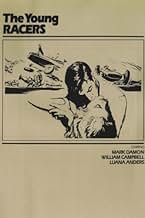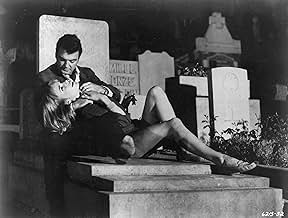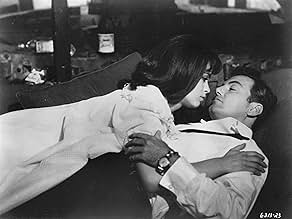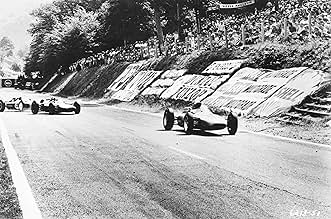Ajouter une intrigue dans votre langueA former race car driver-turned-writer attempts to expose a ruthless, womanizing Grand Prix racer - who may actually be sensitive and misunderstood.A former race car driver-turned-writer attempts to expose a ruthless, womanizing Grand Prix racer - who may actually be sensitive and misunderstood.A former race car driver-turned-writer attempts to expose a ruthless, womanizing Grand Prix racer - who may actually be sensitive and misunderstood.
- Réalisation
- Scénario
- Casting principal
R. Wright Campbell
- Robert Machin
- (as Robert Campbell)
Margrete Robsahm
- Lea Anderson
- (as Margrete Robsahn)
Béatrice Altariba
- Monique
- (as Beatrice Altariba)
Jimmy Clark
- Self
- (non crédité)
Roger Corman
- Man outside Monaco Hotel
- (non crédité)
Bruce McLaren
- Self
- (non crédité)
Avis à la une
Well, that's a terrible title. I mean, these people don't seem that young, but Roger Corman was trying to make movies for teenagers. So, selling to them the idea that it was about young people fit the bill. I mean, one lead was about 30 and the other was in his 40s. These aren't teenagers. I did coincidentally watch Patrick H. Willems' video essay about racing in film a couple of months before I watched The Young Riders, and Corman's propensity for frugality seemed to have led to something of a small breakthrough in cinema: filming real actors in real cars on real roads racing for real. That's neat. The rest of the movie, though? It's alright. A character piece without the right kind of structure or stakes to give it the dramatic push it needs to be actually interesting. Still, I appreciated it for trying to a limited degree.
Stephen Children (Mark Damon) is a former racecar driver in Monte Carlo to see the Grand Prix but also to meet his fiancée, Monique (Beatrice Altariba). Along with his secretary, Henny (Launa Anders), he waits in a café only to discover Monique having a public scene with the winner of the race, Joe Machin (William Campbell), with whom she'd been having an affair. Stephen decides that he's going to destroy Joe by getting close to him and writing a book to expose all of Joe's flaws to the world.
Where the film falters is in how it structures everything. The script by R. Wright Campbell is a slow moving character piece, but it spends so much time on Stephen getting to know and like Joe that any sense of tension at Stephen's hidden motive gets lost by the halfway point. At best, the film becomes this portrait of Joe, a man consumed by fear every time he gets in the cab of his car. However, how this relates to his womanizing seems intentionally obfuscated, like it was an attempt to create a complex character, but I just don't think the writing is quite there. It's an interesting attempt, but I wouldn't call it successful.
Where the film gets really weird structurally is in the introduction of Sir William Dragonet (Patrick Magee). He's brought in when the racing circuit reaches England, and the racers have lunch with him. He seems like just a rich fan of the game, but he ends up like Stephen. He has a personal grudge against Joe and wants to destroy him. When Stephen won't play Sir William's game, Sir William decides to reveal to Joe Stephen's original intention, opening up the rivalry between the two men.
And suddenly I saw what this movie should have been.
The two men were becoming friends as they progressed in races. Stephen ends up on a rival racing team early in the film, and they're out on the track multiple times. But the races are essentially just racing footage because Stephen is getting friendly with Joe before every race. There's little drama in the racing, until the finale. What if Stephen never hid his motive? What if his getting onto a rival racing team wasn't just something that happened to him because he decided to show off on a test lap but he forced his way on because he wanted to face down Joe on the track? It'd be closer to a generic racing movie, probably, but it'd have actual drama infusing its runtime instead of this leaden attempt at a character study.
The racing footage, though, is where the film is at its best. It's not always actually dramatic because of the story around it, but the fast moving cars, filmed from inside the cars themselves, is gripping if thin entertainment. When things do actually get dramatic for that final race in England, though, it's an extra layer on top that makes the event pop that much more.
So, the script, like many Corman films, needed another rewrite (Campbell wasn't a bad writer, and maybe he could have managed it himself). There's the production idea (race cars) and a script idea (the fearful athlete) that don't quite mesh as well as they should, but the actors are all game and do their best. It's always fun to see Trelane in something other than that one Star Trek episode.
It has some charms. It doesn't gel. It's far from the worst film Corman ever made, but it's also far from his best.
Stephen Children (Mark Damon) is a former racecar driver in Monte Carlo to see the Grand Prix but also to meet his fiancée, Monique (Beatrice Altariba). Along with his secretary, Henny (Launa Anders), he waits in a café only to discover Monique having a public scene with the winner of the race, Joe Machin (William Campbell), with whom she'd been having an affair. Stephen decides that he's going to destroy Joe by getting close to him and writing a book to expose all of Joe's flaws to the world.
Where the film falters is in how it structures everything. The script by R. Wright Campbell is a slow moving character piece, but it spends so much time on Stephen getting to know and like Joe that any sense of tension at Stephen's hidden motive gets lost by the halfway point. At best, the film becomes this portrait of Joe, a man consumed by fear every time he gets in the cab of his car. However, how this relates to his womanizing seems intentionally obfuscated, like it was an attempt to create a complex character, but I just don't think the writing is quite there. It's an interesting attempt, but I wouldn't call it successful.
Where the film gets really weird structurally is in the introduction of Sir William Dragonet (Patrick Magee). He's brought in when the racing circuit reaches England, and the racers have lunch with him. He seems like just a rich fan of the game, but he ends up like Stephen. He has a personal grudge against Joe and wants to destroy him. When Stephen won't play Sir William's game, Sir William decides to reveal to Joe Stephen's original intention, opening up the rivalry between the two men.
And suddenly I saw what this movie should have been.
The two men were becoming friends as they progressed in races. Stephen ends up on a rival racing team early in the film, and they're out on the track multiple times. But the races are essentially just racing footage because Stephen is getting friendly with Joe before every race. There's little drama in the racing, until the finale. What if Stephen never hid his motive? What if his getting onto a rival racing team wasn't just something that happened to him because he decided to show off on a test lap but he forced his way on because he wanted to face down Joe on the track? It'd be closer to a generic racing movie, probably, but it'd have actual drama infusing its runtime instead of this leaden attempt at a character study.
The racing footage, though, is where the film is at its best. It's not always actually dramatic because of the story around it, but the fast moving cars, filmed from inside the cars themselves, is gripping if thin entertainment. When things do actually get dramatic for that final race in England, though, it's an extra layer on top that makes the event pop that much more.
So, the script, like many Corman films, needed another rewrite (Campbell wasn't a bad writer, and maybe he could have managed it himself). There's the production idea (race cars) and a script idea (the fearful athlete) that don't quite mesh as well as they should, but the actors are all game and do their best. It's always fun to see Trelane in something other than that one Star Trek episode.
It has some charms. It doesn't gel. It's far from the worst film Corman ever made, but it's also far from his best.
On IMDb, an average film actually has a rating of about 6.0-6.5, this this movie's current 3.5 would seem to indicate that it's a terrible film. However, I was surprised that aside from some poor writing here and there, the film was easy to watch and surprisingly good considering its minuscule budget.
Let's talk about budget for a moment. Despite having a budget of about $150,000 and coming from the king of cheapies, Roger Corman, you'd think it would look bad--like his earlier low-budget films "Wasp Women" and "The Last Woman on Earth". But, the film crew clearly spent money in particular places. First, the film is made in color--really nice looking color on the DVD. Second, the movie was filmed in several locations throughout Europe. And, finally, they used Formula One cars and instead of using the usual stock clips, they filmed the drivers very, very realistically. Clearly the movie looks great.
When it came to budget, you can soon see that one way they cut costs was by using no-name actors. William Campbell is a face you might recognize if you are a Trekkie, as he played a couple prominent guest spots in the original series (The Squire of Gothos and a Klingon captain). Handsome, yes....but also a rather obscure actor--particularly when this film was made. The other lead is Mark Damon--and it really threw me when he entered the movie. Why? Well, because evidently someone hated his voice and all his dialog was dubbed by William Shatner! So, once again, for Trek fans, this is an interesting film.
Another way they cut back was on the writing. While the script had bright moments, it also had a decent number of clichés and was far from brilliant. Heck, with a few revisions, the movie could have really been very good. As is, the racing scenes are mostly great (except for the scene where Damon rolls out of his car--it was badly done), the actors competent and the locales lovely. I did not love this film but liked it and see it as a great example of getting a lot of bang for the buck. Too bad later films like "Le Mans" and "Grand Prix" had the big-name stars and polish--they clearly overwhelm what is still a pretty decent film.
Let's talk about budget for a moment. Despite having a budget of about $150,000 and coming from the king of cheapies, Roger Corman, you'd think it would look bad--like his earlier low-budget films "Wasp Women" and "The Last Woman on Earth". But, the film crew clearly spent money in particular places. First, the film is made in color--really nice looking color on the DVD. Second, the movie was filmed in several locations throughout Europe. And, finally, they used Formula One cars and instead of using the usual stock clips, they filmed the drivers very, very realistically. Clearly the movie looks great.
When it came to budget, you can soon see that one way they cut costs was by using no-name actors. William Campbell is a face you might recognize if you are a Trekkie, as he played a couple prominent guest spots in the original series (The Squire of Gothos and a Klingon captain). Handsome, yes....but also a rather obscure actor--particularly when this film was made. The other lead is Mark Damon--and it really threw me when he entered the movie. Why? Well, because evidently someone hated his voice and all his dialog was dubbed by William Shatner! So, once again, for Trek fans, this is an interesting film.
Another way they cut back was on the writing. While the script had bright moments, it also had a decent number of clichés and was far from brilliant. Heck, with a few revisions, the movie could have really been very good. As is, the racing scenes are mostly great (except for the scene where Damon rolls out of his car--it was badly done), the actors competent and the locales lovely. I did not love this film but liked it and see it as a great example of getting a lot of bang for the buck. Too bad later films like "Le Mans" and "Grand Prix" had the big-name stars and polish--they clearly overwhelm what is still a pretty decent film.
Handsome writer, and racing car enthusiast, Mark Damon (as Steve Children) decides to pen the biography of Grand Prix champion driver William Campbell (as Joe Machin). As it turns out, Mr. Campbell is "arrogant, ruthless, crude, and altogether a hateful human being." In Mr. Damon's full view, Campbell ended an affair with Damon's fiancée. Damon wants to expose Campbell's bad character, but is drawn to the charismatic playboy. The two men duel over the affections of women like Damon's blonde secretary Luana Anders (as Henny), and form an unexpected friendship. Not a very good film, certainly; but, you can see where one was possible.
**** The Young Racers (5/22/63) Roger Corman ~ Mark Damon, William Campbell, Luana Anders
**** The Young Racers (5/22/63) Roger Corman ~ Mark Damon, William Campbell, Luana Anders
One of producer / director Roger Cormans' exploitation-subculture flicks, "The Young Racers" is intended to take a look at the lives and personalities of those who make their living racing cars. Mark Damon plays Steve Children, a former racer turned writer who learns that champion driver Joe Machin (William Campbell) has used and discarded Steves' fiancee Monique (Beatrice Altariba). Aiming to get back at Joe (a flamboyantly arrogant, cocky type) somehow, Steve works his way into Joes' life, pretending that he's penning a novel and needs inspiration. But as time goes by, he learns more about Joe, realizing that this man who's come off as such a conceited pig is actually more sensitive and troubled than it appears.
Although there is some fairly intense, well-edited, and exciting racing action, "The Young Racers" is one of those racing dramas that spends more time off the track. It functions more as a character study. As written by Campbells' younger brother / fellow actor Robert (R. Wright) Campbell, it includes some good and interesting insight, if perhaps some overly grandiose dialogue. The main reason to watch "The Young Racers" is to watch an engaging cast fill out these roles. Damon (who's actually looped by none other than Bill Shatner!) and Campbell do a fine job, receiving strong support from a very attractive bunch of actresses. Luana Anders is front and centre as Steves' loyal secretary Henny, while Marie Versini makes the most of a compelling role as Joes' equally loyal wife Sesia. The great Patrick Magee pops up in the final quarter of the film to play a pivotal role.
As was often the case with Corman films, he paces it well enough so that it clocks in at roughly 80 minutes or so (although in his case it was always an economical decision). It's good entertainment with a jazzy score by Les Baxter, the prolific composer who contributed to a large number of A.I.P. exploitation features.
Among the technical crew: Francis Ford Coppola as the sound man, Menahem Golan as the property master, and longtime Corman colleague Charles Griffith as the assistant director.
Seven out of 10.
Although there is some fairly intense, well-edited, and exciting racing action, "The Young Racers" is one of those racing dramas that spends more time off the track. It functions more as a character study. As written by Campbells' younger brother / fellow actor Robert (R. Wright) Campbell, it includes some good and interesting insight, if perhaps some overly grandiose dialogue. The main reason to watch "The Young Racers" is to watch an engaging cast fill out these roles. Damon (who's actually looped by none other than Bill Shatner!) and Campbell do a fine job, receiving strong support from a very attractive bunch of actresses. Luana Anders is front and centre as Steves' loyal secretary Henny, while Marie Versini makes the most of a compelling role as Joes' equally loyal wife Sesia. The great Patrick Magee pops up in the final quarter of the film to play a pivotal role.
As was often the case with Corman films, he paces it well enough so that it clocks in at roughly 80 minutes or so (although in his case it was always an economical decision). It's good entertainment with a jazzy score by Les Baxter, the prolific composer who contributed to a large number of A.I.P. exploitation features.
Among the technical crew: Francis Ford Coppola as the sound man, Menahem Golan as the property master, and longtime Corman colleague Charles Griffith as the assistant director.
Seven out of 10.
A former race-car driver-turned-writer decides to expose a ruthless, womanizing Grand Prix race driver in a book. However, his scheme explodes when his life is saved by this man, who is actually sensitive and misunderstood.
While not Corman's best work, there is a good cast here with Mark Damon and uncredited voice-overs by William Shatner. The script was written by Robert Wright Campbell, who received an Academy Award nomination for his screenplay "Man of a Thousand Faces", the biography of Lon Chaney. Robert's brother William also stars in this alongside Damon. (William, interestingly, filmed "Dementia 13" immediately after this, under the guidance of Corman protégé Francis Ford Coppola, and also had some "Star Trek" appearances -- with Shatner!) William Campbell's ex-wife, Judith Exner, was notorious for having affairs with President Kennedy and two Chicago mobsters... but that is neither here nor there.
While not Corman's best work, there is a good cast here with Mark Damon and uncredited voice-overs by William Shatner. The script was written by Robert Wright Campbell, who received an Academy Award nomination for his screenplay "Man of a Thousand Faces", the biography of Lon Chaney. Robert's brother William also stars in this alongside Damon. (William, interestingly, filmed "Dementia 13" immediately after this, under the guidance of Corman protégé Francis Ford Coppola, and also had some "Star Trek" appearances -- with Shatner!) William Campbell's ex-wife, Judith Exner, was notorious for having affairs with President Kennedy and two Chicago mobsters... but that is neither here nor there.
Le saviez-vous
- AnecdotesDue to on-set sound recording issues, most of the dialogue in the film had to be re-dubbed. All of Mark Damon's dialogue was looped by an uncredited William Shatner. Patrick Magee's dialogue was also looped by an uncredited actor.
- GaffesWhen the story shifts from Monaco, the inter-title before the next scene says Spa, Belgium and Robert and Sesia then meet in front of a church. The church is actually Notre Dame Cathedral in Rouen, France.
- ConnexionsReferenced in Pulp Fiction (1994)
Meilleurs choix
Connectez-vous pour évaluer et suivre la liste de favoris afin de recevoir des recommandations personnalisées
Détails
Box-office
- Budget
- 150 000 $US (estimé)
- Durée1 heure 24 minutes
- Mixage
- Rapport de forme
- 1.66 : 1
Contribuer à cette page
Suggérer une modification ou ajouter du contenu manquant



















